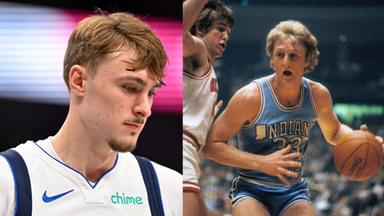Play a game of word association with any basketball fan, and it’s very likely that the first name they think of when they hear Boston Celtics is Larry Bird. Bird played his entire 13-year career with the Celtics, leading them to three NBA championships and winning three MVPs on his way to the Hall of Fame. But the franchise was, of course, the most successful in the sport even before he arrived. It may be shocking, then, to learn that Bird didn’t really know anything about the team before signing with them.
Advertisement
Bird admitted in a 1991 interview that he knew Bill Russell and some of the old players who wore the Celtics jersey but said, “I never did watch them play.” That might sound insane to a modern basketball fan, though it’s important to remember that the NBA wasn’t as easily accessible back in the day as it is now.
NBA fans of today can see NBA games and highlights in the blink of an eye on their smartphones, but most games weren’t even televised decades ago, and, often, when they were, they were on tape delay. It’s also especially unlikely that someone from French Lick, Indiana, had any way to see Celtics games anyway, as mosts broadcasts were regional.
Regardless of his unfamiliarity with the organization, Bird was pleased they chose him… but he made them wait. The Celtics drafted Bird with the sixth overall pick in the 1978 NBA Draft after his junior year at Indiana State. In a fact few know today, Bird opted to return to school rather than go pro, famously leading the Sycamores to the NCAA title game, which they lost to Magic Johnson and the Michigan State Spartans.
That game kickstarted the best rivalry in NBA history, but it wouldn’t have happened if Bird hadn’t returned to school.
Larry Bird’s Celtics signing loophole has since been closed
Nowadays, players must declare for the draft before teams can select them (known as the Larry Bird Collegiate Rule), but that wasn’t always the case. Even though Bird returned to school after being drafted, the Celtics still had the right to sign him when he graduated. They chose him because they knew he was worth the wait, and they were right, as he went on to win Rookie of the Year and become one of the greatest players of all-time.
Bird didn’t know about the Celtics’ tradition, but he was moved by their loyalty.
“The only thing that really impressed me is that the Celtics took me and waited a year. I just couldn’t believe they would do that. I thought it was awful loyal for someone to wait a year without trading me or taking a chance that I wouldn’t sign with them. I thought it was very loyal, and I had to give them (the) first opportunity.”
Bird reciprocated that loyalty, signing with the Celtics just before his draft rights were set to expire in 1979. His arrival immediately helped return the franchise back to its place at the forefront of the league, as they improved by 32 wins and made the conference finals in his rookie year, then won three of the next six titles.
Bird’s loyalty to the Celtics lasted through his retirement
As was reported in When the Game Was Ours, Bird and the Celtics remained loyal to each other all the way through his final days as a player. The sweet-shooting forward had dealt with a chronic back injury through his later years, and, after the 1992 Olympics, was ready to call it a career. He informed Celtics CEO Dave Gavitt, who urged him to wait a few weeks to make his announcement.
That waiting period allowed Bird to collect an extra $10 million in salary, a figure the Celtics were only too happy to pay due to Bird’s lifetime contributions to the franchise. “After everything number 33 had done for the Boston Celtics, Gavitt felt he deserved the money. ‘I know what you are doing,’ Bird said. ‘I don’t want the money. I didn’t earn it, and I won’t take it. Let’s just get this over with.’”
Bird held on to his principles and didn’t accept the money, opting to retire on his own terms instead.
It shouldn’t have been a surprise to anyone who knew the way Bird operated, and at the same time, the Celtics showed their class as an organization as well. Bird may not have known about the Celtics’ tradition when he was drafted by the team, but he certainly contributed to it in a meaningful way.








